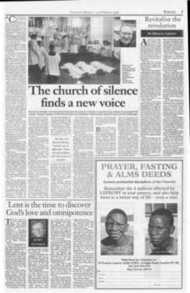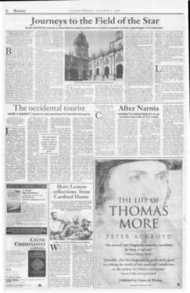Page 5, 13th March 1998
Page 5

Report an error
Noticed an error on this page?If you've noticed an error in this article please click here to report it.
Tags
Share
Related articles
A Great Book Is Issued
Voices From The East
Pope Vows To Speak Out
Thousands Of Russian Martyrs Canonised
The Latest Books, By Fr. W. J. Randall
The church of silence finds a new voice
Since the relaxation of communist persecution the church in Russia is experiencing a phase of unprecedented growth. Sergei Polyakov of RIA-Novosti talks to Archbishop Kondrusewicz about the joys and the challenges
C
C AT HOLICISM AND Orthodoxy
will soon be ushe,ring in a great feast the coming of the Third Millennium of the Christian era. We are enter „. mg the new Millennium with divided Christianity, so every effort must be made to get it
reunited,” Archbishop Tadeusz Kondrusewicz, Apostolic Administrator for Roman Catholics of European Russia, told a Moscow press conference earlier this year.
It is a remarkable statement, especially when it is considered in the light of events in the Russian Church over the ' past 80 years.
Before the 1917 Revolution the Catholic Church had, within the modern-day boundaries of the European part of the Russian Federation, a total of 150 parishes, I three million adherents, over 250 priests, two seminaries and two episcopal cathedrals. The largest Catholic community (13 parishes) was based in the Russian Empire's capital city, St Petersburg, home of a famous Catholic academy as well as 14 women's and seven men's monastic communities.
Under the Communist regime the Roman Catholic Church was seen not only as an idealogical adversary of communism but also as a "spy" organization connected with foreign special services.
Like other Christian traditions, the Catholic Church . experienced persecution, so much so that by the end of , the 1930s there were only two , Roman Catholic parishes left in the country: St Louis in , Moscow and Our Lady of Lourdes in St Petersburg. At best, former Catholic churches were used as concert halls. At worst they were turned into ,warehouses or workshops. Their restoration only started ,,in the 1980s, and had to be practically from scratch.
As recently as 1991, in western Russia which accounts for up to 40 per cent of the territory of Europe there were as few as six parishes served by only three priests. In that year the Holy See appointed two apostolic administrators (one for European Russia and the other for the Russian lands lying on the Asian Continent).
"Today there are 96 officially registered parishes in the country, supporting 25 cathedrals and 28 chapels, half of which are under renovation," notes Archbishop Kondrusewicz.
He is a man who has been in a prime position to witness at first hand the remarkable resurrection of the Russian Church. Born in the village of -Odelsk in Byelorussia on January 3, 1946, he went to the Grodno Teachers' Training Institute after secondary school, but was forced to leave. He went on to graduate in 1970 with a degree in „mechanical engineering from the Leningrad Polytechnical Institute.
In 1976 he entered the Kaunas Theological Seminary in Lithuania and was ordained to the priesthood on May 31, 1981. From then until 1988 he served in various Lithuathian parishes, mainly in Vilnius. By the time the restoration of churches was underway, in 1985, Fr Kondrusewicz received the degree of Licentiate of Theology from Kaunas Seminary, and successfully defended a doctoral thesis at the same department three years later.
In 1989 Pope John Paul TI appointed him Titular Bishop of Hippo Zarytus, an ancient Christian city in North Africa, the episcopal see of which was held by St Augustine 1,600 years before.
It was at this time that Fr Kondrusewicz was appointed Apostolic Adminstrator of the Minsk Diocese for the Byelorussian Catholics.
His present position, as Archbishop and Apostolic Administrator for the Catholics of the Latin Rite in European Russia, was conferred upon him in St Louis Church in Moscow, May 23, 1991.
During the years since his appointment, he has seen the Russian Church not just restored, but enter a period of growth and development.
"Perhaps the best situation today is in St Petersburg," he told me. "There the Roman Catholic community has five major churches.
"We've got 114 priests, although only six of them have Russian citizenship. All the others are foreigners. Their command of the Russian language leaves much to be desired, and this creates certain difficulties as 70 per cent of the religious ceremonies are performed in Russian. Then come Polish, Lithuanian, German, and other European languagesWe even have a Korean Catholic community. We have 125 nuns of which ten are Russians. The others hail from 17 different countries around the world.
"Our Seminary of Mary, Queen of the Apostles, has been functioning since 1993 and provides a five-year programme of study. It is currently attended by 60 students. We have seven people now pursuing theological studies in Poland, Slovakia, the Czech Republic and Italy. Last year I ordained three priests and three deacons. Next year I expect to ordain another three priests and four deacons."
The Thomas Aquinas College of Catholic Theology, offering a three-year programme of study to laymen, does a lot in the sphere of education and research. It has its headquarters in Moscow and branches in St Petersburg, Kaliningrad, Saratov, and Orenburg. The college teaches a total of about 300 students who simultaneously attend courses in secular colleges and universities. The College's teaching staff and students actively work towards restoration of the huge layer of Roman Catholic terminology lost in the years of the Soviet regime.
This is exceptionally important for the preparation and publication of theological and liturgical literature in the Russian language. Among other things, they have contributed to the translation and publication of a Russian edition of the Catechism of the Catholic Church.
There is also a Catholic charity organization, Caritas, and since 1994 there has been a weekly newspaper, The Light of the Gospels, with a circulation of 3,500 copies. The newspaper focuses on the life of the Roman Catholic Church in Russia and in the rest of the world. And there are also now two Catholic radio channels: Moscow's DAR and St Petersburg's Gracious Mary.
However, the Archbishop adds, the life of Russian Roman Catholics has its difficulties. There are a lot of problems with the recovery of their property and the obtaining of permits to erect new cathedrals. The construction of a cathedral in Saratov did not get underway until 1997, as the permission to build one had had to be sought for five years. There is a lack of priests and of religious literature. However a total of more than 150 new books by Russian and foreign authors has been released in Russia in the past few years.
BEFORE. THE BOLSHEvIK Revolution, Roman Catholicism was followed predominantly by Poles, Germans, Lithuanians and some Russians. There are about 300,000 Roman Catholics in European Russia, of which 65,000 live in Moscow. These are primarily urban intellectuals. Very few Catholics can be found in rural areas of the country, and those that do are scattered over a wide area.
"We have no problem getting along with represen tatives of other major religions," the Archbishop said in concludion. The interdenominational dialogue is becoming more extensive. We have established normal relations with the Orthodox Church, the largest Church in Russia, despite all the controversies of the past and present.
There has been an interdenominational consulting committee functioning since 1994, with its three co-chairmen representing Russia's Orthodox, Roman Catholic and Protestant Churches.This committee has already organised two conferences one in 1994, at a venue in Moscow, and other in Minsk in 1996. It is to be hoped that such cooperation will continue."
blog comments powered by Disqus













